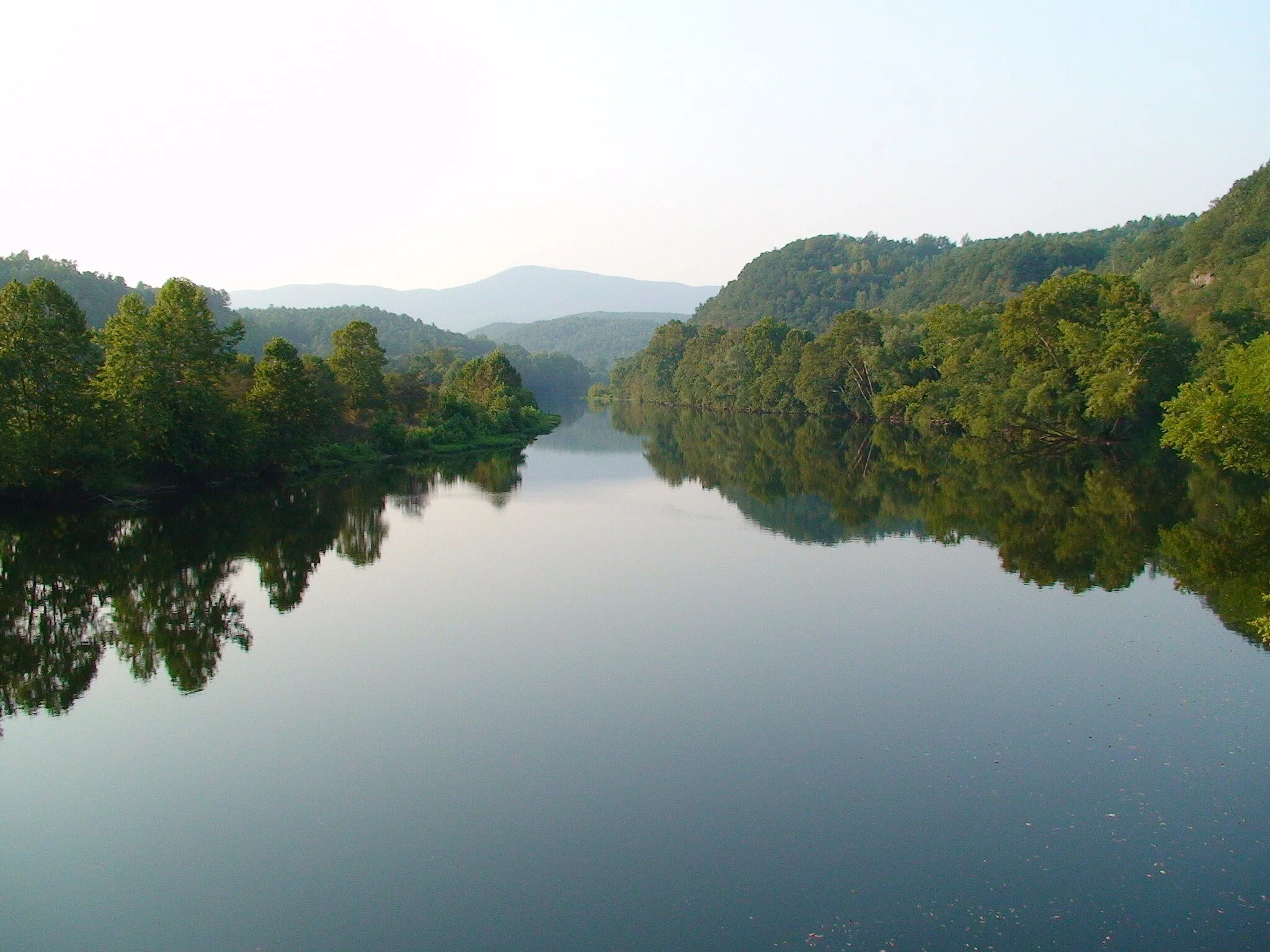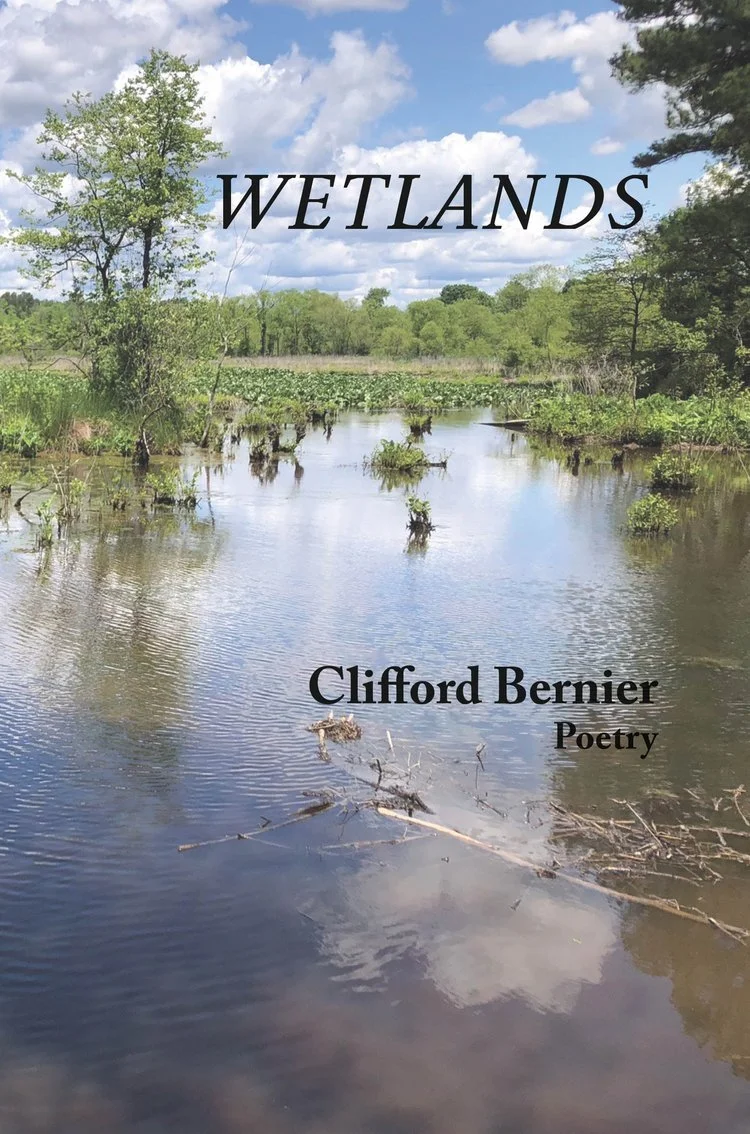Poems of mystery and shape-shifting along the James River
Image: Thea Ganoe, Public domain, via Wikimedia Commons
a review of Clifford Bernier’s Wetlands
by Naomi Thiers
In Wetlands—the last poetry book published by the generous and talented local poet Clifford Bernier before his death from cancer in May 2025—every idea, adjective, speech, metaphor or transformed creature connects to a river. Connects to and flows to what Bernier calls “the river.” This river—character, setting, and mouthpiece all in one—seems to be the James River in southern Virginia. Many creatures speak here, though some are mythical. But like the shape-shifting animals who converse in many of these poems, the river that runs through Wetlands is ultimately both unknowable and wild. It seems to be a symbol or metaphor—but one that doesn’t say outright what the river’s waters, currents, wooded banks etc. are being compared to.
Clifford Bernier was the author of five books and a well-loved poet in the DC area poetry community, active with several writers groups. He was a stellar, generous person as well as a skilled writer—and harmonica player. In Wetlands, the speaker actually tells readers from the first poem in the book that they are entering a slippery mystery—and that hey, you, reader, must also become mysterious if you are to savor these verses. The book begins:
To live in this metaphor
you must be someone else
though who you really are
is unknown. If to know is to
understand, which it is not.
You can invent yourself
but within restrictions.
The way you move too
has resonance, though
its meaning is elsewhere.
The river is here, however,
turning from the Piedmont
through Richmond to the sea.
That is, to fantasy.
– from “River”
From the get-go, Bernier pulls the rug out from under the reader (gently, but with koan-like force). In this poem, to know does not mean to understand; your gestures have resonance, but not meaning, and when some natural element reaches the sea, it becomes … unreal, a fantasy. I felt disoriented and intrigued after reading these lines. The switch in the last few lines of the poem to treating the James River as language to be tamed or as a symbol of imagination didn’t quite clear up my vertigo:
That is, to fantasy. Who can
reveal the source? Translate
the translation? The raccoon,
the possum, the trout?
The paraphrase, the wild
imagination, the river flow.
But I plunged on, even with a bit of vertigo, and got pulled down this wonderful river of words. And I noticed that blurred borders, identity shifts, and the pairing of a thing with its absence (as in “thing versus no-thing”) surface all through this book. I almost hate to talk about the ideas and concepts in these poems because I’d like to get quicker to their lush music. But the ideas are so foregrounded that the poet must have wanted them pondered. Those ideas are also presented elliptically. I don’t think Cliff Bernier was trying to be obscure or paint himself as a mystic to sound “poetic.” But his observations of landscape and life on banks of the James are often philosophical and not easy to parse, as in “Bluegill and Trout”:
Why do the trees speak of trees
why do the fish speak of fish
even the oriole speaks of the vireo
even the coyote speaks of the fox
at this beginning and this end
as the river slips south, shifting
forward in form not-form
in sound in time and thought
out of time but still in time
by the James a metaphor for
the no-James, and vice-versa
a paraphrase of a translation
a thing of beauty, hopeful
and alive, perhaps, real and true
while the trees speak of no-trees
while the fish speak of no-fish
said the bluegill to the trout.
Even when animals speak here, they don’t speak of animal concerns, but of ideas. The beaver in
these lines from“Beaver and Fox” seems to be an artist or a philosopher:
Said the beaver to the fox
the hutch I built will not last
but this fantasy will—
the flapping ripples leaping
crappie the river ridges
folding like Merwin’s cliffs
At the poem’s end, the fox in reply “translates” what the beaver says by shape shifting:
Said the fox the paraphrase
The translation I am a possum
I am a muskrat let me in.
I’m not sure I get what this poem is trying to say: Is the fox—a predator, not a water dweller like beaver or muskrat—trying to blur boundaries here, to be accepted as a fellow imaginative creature? Does the beaver’s fantasy mean art, like W.S. Merwin’s poetry? It’s mysterious—but I appreciate that mystery, and the beauty of lines like “the flapping ripples leaping/crappie the river ridges/ folding…”
In many other poems, the poet grapples with his identity as a human in this riverscape, and with whether he is truly separate from animals—or whether he only labels himself “human” while the creatures surrounding him know his true essence. Here’s part of “Swallows”:
—swallows
outlining me here on this perch
overlooking the James in the sunset
by being swallows and I them—
and seeing the light sink to pink
not purple is the pink in me
sinking to light and the swallows
knowing me by being and I the
swallows by not being swallows.
And in “Riverfish,” a bird living by the river challenges “the “sullen elk” (a character that appears in several poems and seems to represent the poet), asking, “Does it annoy you/ to think that you/are real and not-real?/ Would you like to be/ one or the other? Do you think either/ has an advantage?” The bird suggests the scene the elk perceives around himself might be an illusion, and that he may not even be an elk at all, but something more watery:
[Do you think] That the swaying
tree trunks and the
swinging raindrops
are perhaps elsewhere
and you are maybe
a riverfish?
Finally, in the minimalist poem “I Rise with the Birds,” the boundary between the poet and the animal world disappears:
when light conjures
song.
When cold calls
my flock
south.
When wind
carries me
over tempest
and tremor,
and troubles
below
look small.
When night
falls
and I spiral
down
I rise with the birds.
At Cliff Bernier’s memorial in July—which I attended along with many others from the local poetry community and a big crowd of family and friends whose life he touched— two people chose to read “I Rise with the Birds” in tribute to him. It was mentioned at this service that Cliff had a lifelong habit of going into the wilderness, or even the trees in his backyard, to sit among nature and write. One friend recounted that on camping trips, Cliff would recite poetry out loud in a woods clearing, using a portable podium.
Like the sullen elk, the “sad king” is a character in some poems that seems to me to be an aspect of the poet. In these lines, the elk and king talk together about how beautiful things fade and rise:
Said the sullen elk
to the sad king
see the autumn
splendor fade like
forb and fall like
fish in fallow streams.
Said the sad king
see the dry fields
fly like falcons and
rise like roosters
when tint returns.
– from “The Sullen Elk”
In the book’s last poem, “James,” the speaker is leaving a beloved place by the James River. Since the book began by inviting a reader to “live in this metaphor” of the river, Wetlands seems to come full circle as the writer says goodbye to it. I’ll close this review with that poem in full. There’s a tone of melancholy yet also a comforting sense of timelessness and of the ongoing power of rivers and woods, of fields, animals, and human families (like the poet’s own):
James
It’s not easy saying goodbye
to the James. Motion always
moving, portal to a timeless
place in time—yet beyond is
the gulch and the cornfield
and cows, Horse Mountain
and the Allegheny like rolling
surf, steam of clouds like broth
feeding the pasture below,
homestead high on the hill,
the hay and the wildflowers,
forest and the frothy creek
where the river turns to rest,
singing with the singing earth.
Buy your copy of Wetlands directly from the publisher here. Learn more about the author on his website: www.cliffbernier.com
Clifford Bernier’s The Silent Art won the Gival Press Poetry Award. He is also the author of Dark Berries and Earth Suite, each selected by the Montserrat Review as a Best Chapbook, and of Ocean Suite. His collection Bakary and the River is forthcoming. He appears in The Write Blend poetry circle collection among other print and on-line journals and anthologies. In addition, Mr. Bernier appears on harmonica in the Portuguese Accumulated Dust world music series and is featured on the EP Post-Columbian America. He was featured in readings in Los Angeles, Seattle, Chicago, Buffalo, Detroit, Philadelphia, Baltimore, and the Washington, DC area, including the Library of Congress, the Arts Club of Washington, George Washington University (where he is a member of the Washington Writer’s Collection) and the Bethesda Writer’s Center. He was a reader for the Washington Prize and a judge for the National Endowment for the Arts’ Poetry Out Loud recitation contest. From 2003-2008 he hosted the Poesis reading series in Arlington, Virginia and performed with the Jazzpoetry band at venues in and around Washington, DC. He was nominated for two Pushcart Prizes and a Best of the Net Award. He lived in Alexandria, Virginia until his recent death.
Naomi Thiers has published five poetry collections including Only the Raw Hands Are Heaven (WWPH), In Yolo County and She Was a Cathedral (Finishing Line) and Like a Bird Released (Sligo Creek Press). Her work has appeared in Virginia Quarterly Review, Poet Lore, Colorado Review, and many others. She lives and writes in Arlington, Virginia.



